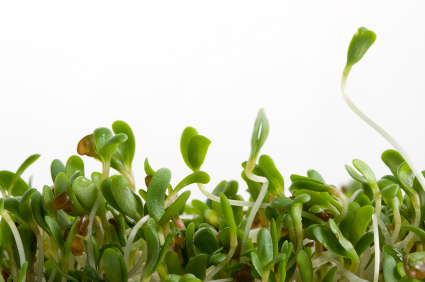When an extended or longer-term emergency occurs, you will need to find a fast way to produce vitamins in order to maintain proper functioning in your body and avoid malnutrition. Pound for pound, sprouts are the way to achieve this.
Sprouts are a delicious alternative to expensive bottles of vitamins which can lose their nutritional value as well as expire within a year of it being purchased. In fact, sprouts provide the highest amount of vitamins, minerals, proteins, and enzymes of any of food per unit of calorie. Enzymes are essential because they heal the body, cleanse the body, prevent diseases, enhance the general functioning of bodily organs, aid in digestion, and remove gas from the stomach.
Once a seed has germinated, it begins to sprout. Within these sprouts contains vitamins A, B, C and E, and K, as well as, calcium, potassium, zinc, chlorophyll, amino acids, and up to 35% protein. Inside these small biogenic (living) foods lies essential nutrients and vitamins that can assist in providing a good portion one’s daily requirement of nutrients. Sprouts can grow anywhere, during any season, and require minimal work.
You can invest in low-cost sprouting kit like this one, and sprout different varieties all at once, or purchase a lid that screws on a mason jar to grow one variety or one type of mix. I prefer to purchase sprouting seeds that non-GMO and organic varieties to get the full nutritional benefits. Once your sprouts have sprouted, add them to salads, soups, meals or munch on them as a snack.
These small living plants are commonly referred to as complete foods because they are packed with high levels of complete proteins, vitamins, minerals, enzymes and extraordinary amounts of protein. When eaten, the sprouts provide the body with nutrition and gives the body what it needs to stay strong and healthy on a daily basis. In fact, James Wesley Rawles creator of the Survivor Blog believes that “ounce for ounce, sprouting seeds are the most nutritious and space and weight efficient form of storage food!”
Anything Can Be Made Into a Sprout
The most common types of seeds to sprout include alfalfa, fenugreek, peas, lentils, radish, broccoli, cabbage, mustard seed, garbanzos, quinoa and red clover. However, many people sprout grains, nuts, and an assortment of beans as well.
Sprout Safety
Because raw foods have been known to carry traces of salmonella and e. coli, it is suggested to use organic seeds or untreated seeds since these type of seeds have no traces of insecticides and have been handled in a way that minimizes contamination. Additionally, persons that have compromised immune systems or those that are very young should avoid raw sprouts.
To prevent this health issue, you can follow these safety steps:
- Wash all sprouts thoroughly with filtered water before eating them.
- If you’ve purchased sprouts at the grocery store, look for the International Sprout Growers Association seal on the package or if you are buying bulk, ask your grocery if the sprouts are ISGA-approved.
- If the sprouts are pre-packaged, only purchase if the sell-by date is current or even a few days ahead.
- Examine the sprouts to make sure the roots are clean. If the stem color is not white or creamy, do not purchase them. Do not purchase sprouts if the buds are no longer attached, if they are dark in color or have a musty smell.
- Smell the sprouts to be sure that they have a clean, fresh odor.
- Keep the sprouts refrigerated.
- After 2 days, compost them rather than consuming them yourself.
- If you’re buying in bulk, ask your grocer about the sell date.
- If you are sprouting seeds at home, follow the same guidelines described above. Learn about the source of your seeds, their ISGA-certification, and either have your grocer confirm high-quality standards for seed production or obtain contact information for the seed source and contact that company yourself.
- Follow the above guidelines regardless of the type of seeds you are sprouting, i.e., apply the guidelines to mung, alfalfa, radish, broccoli, lentil, sunflower and all other types of sprouts.
It is best not to use seeds from the nightshade family, such as tomato, eggplant, cayenne, ground cherry, paprika, potato, sweet pepper. They can cause serious illness. However, any other type of seed is fine. They can be cooked or eaten raw, and can easily be incorporated into one’s diet.
Related Articles and E-Books:
The Ultimate Guide To Sprouting
This article was originally published at Ready Nutrition™ on April 16th, 2010








I’ve read that you shouldn’t store foods with oxygen absorbers if you are possibly wanting to sprout them at any time in the future. Can you tell me if you agree with that, or have you ever sprouted anything that had been stored with the oxygen absorbers?
Many thanks!
Hi Christi,
Seeds are a living thing and should in all the sense of the word be treated that way. Oxygen absorbers will suck out the oxygen the seeds needs to stay alive. If you plan on storing seeds, ensure that you don’t add an oxygen absorbers.
Thanks so much for the confirmation in your reply. Good to know!
Great article. One suggestion. Instead of Composting “Old” sprouts, plant them in a pot or in the ground and let them continue to grow. Harvest the seeds, so you can regrow more. One of the easiest forms of self-sufficiency!